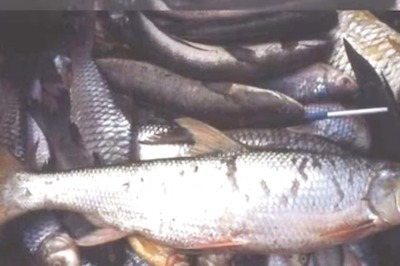
views
Columnist Vir Sanghvi had once said that there is only one superstar in Mumbai and that is Balasaheb Thackeray. Today, Sharad Pawar has emerged as a superstar of Indian politics.
Throughout Maharashtra elections, Pawar remained a central figure. Be it the defining photograph of him addressing a public meeting in Satara, unmindful of a heavy downpour, or telling Devendra Fadnavis in jest that there is only one kushti (wrestling) federation in Maharashtra and it is headed by him.
For the past two weeks, when Pawar’s motives were suspected by friends and foes alike, the Maratha strongman proved everyone wrong, joining the league of YB Chavan, Jagjivan Ram and others who had effectively defied Delhi.
Much of Pawar’s political career has been spent in defying Delhi. It was Indira Gandhi, Rajiv Gandhi, Sonia Gandhi then and now Narendra Modi and Amit Shah. Pawar has remained the son of the soil, turning the tables on the high and mighty. With an exception of Parkash Singh Badal, there is no politician whose glory dates back to 1970s or 1980s.
In the Congress circle, too, Pawar is considered an iconic person. There is no dearth of Congress leaders who greatly value his views and opinion, though Pawar is not part of the Congress now. His equation with Sonia Gandhi is also one of mutual respect and faith.
In fact, soon after 2019 Lok Sabha polls, the Congress and NCP leadership had discussed the possibility of a merger, but the move was shelved due to Rahul Gandhi’s abrupt resignation. When Sena-NCP-Congress talks were held, Sonia made it clear to her own party MLAs, CWC members and the rest that she would do nothing without Pawar’s consent.
As the head of a regional party, Pawar had the option of taking an easier route of striking a deal with the BJP when the Shiv Sena decided to pull out of a pre-poll alliance with its senior partner. But Pawar could sense the disquiet on the ground. The mood in Maharashtra, particularly among Marathas, was anti-BJP, evident from the huge victory margins of many candidates, including Ajit Pawar. Pawar was also mindful of the way the Enforcement Directorate had sought to discipline him. In his assessment, there was a need for a political answer.
Pawar’s differences with nephew Ajit were known to many since the emergence of Supriya Sule on the political horizon. Pawar was aware of how Ajit was trying to field persons loyal to him or fancying himself as a challenger of sorts. Instead of acting against Ajit, Pawar decided to give him a long rope.
Many are not aware that around 10 days ago, Pawar had summoned a meeting of the NCP core committee to thrash out its ties with Sena and Congress. In that gathering, Ajit, Praful Patel and others were given ample opportunity to speak up. But their response was muted and at the end of the meeting, Pawar was authorised to take a final call.
Looking back at Pawar’s impressive political career, the politician offers a mix bag of hits and misses. The closest he came to realising his dream of becoming prime minister was in 1991, after the Congress came to power in the post-Rajiv Gandhi era. Sonia had declined and was unwilling to make any direct intervention. The Pawar camp became pro-active, holding dinners with the help of the likes of Suresh Kalmadi. In the hour of grief, the “indiscretion” of hosting dinners boomeranged as the Maratha strongman was left with the support of barely 54 MPs. In the protracted tug-of-war, Pawar locked horns with the likes of Arjun Singh with bulk of party leaders settling for PV Narasimha Rao as prime minister.
For a large part of his political life, Pawar has not been comfortable in the durbar culture of the Congress. He had deserted the Congress twice and did not get along with Rajiv on account of mutual suspicion. With Sonia during 1998-99, he had no rapport, but was said to have discovered the ‘Italian connection’ when he signed a memorandum of understanding with an Italian wine company way back in the 1960s. This tells a story of Pawar’s political acumen.
While Pawar has emerged as a kingmaker, his nephew Ajit faces a bleak future. Even if Pawar pardons Ajit’s indiscretion, the nephew’s standing within the NCP is bound to be diminished. It remains to be seen how Pawar will treat irrigation scam in the public domain. Any attempt to protect Ajit would have bad optics, while punishing him will show vendetta politics.
The future of Udhhav Thackeray’s cabinet would depend largely on Pawar’s whims and fancies. In this sense, the politics of Maharashtra has reached a pause and is likely to see lot more action and turmoil.
(The author is a visiting Fellow with the Observer Research Foundation. Views are personal.)




















Comments
0 comment